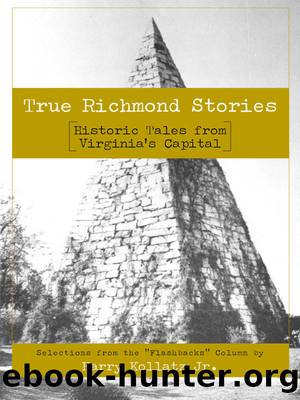True Richmond Stories by Harry Kollatz Jr

Author:Harry Kollatz Jr. [Kollatz, Harry Jr.]
Language: eng
Format: epub
Tags: History, United States, State & Local, South (AL; AR; FL; GA; KY; LA; MS; NC; SC; TN; VA; WV)
ISBN: 9781540217721
Google: _P5ftAEACAAJ
Publisher: Arcadia Publishing (SC)
Published: 2007-07-15T16:20:27+00:00
The Unconstitutional Constitution
The Legacy of 1902
The Virginia Constitution of 1902 caused half the stateâs electorate to lose the vote, in addition to codifying the split of cities from counties and restricting the governor from serving a second successive term. The document also established effective statewide apartheid and maintained political power in the hands of a few. Virginia thus entered the twentieth century shackled by provincialism, elitism and racism.
Vestiges of 1902 linger in law today, despite a successful 1970 overhaul. The chairman of the advisory commission for that 1970 extreme legal makeover was University of Virginia legal scholar and Richmond native A.E. Dick Howard. Howard explains, âThe problem was the rather tempestuous nature of Virginia politics in the 1870s and 1880s. The [Democratic] conservatives saw wholesale buying of votes, mass corruptionâ¦[The 1902 representatives] saw themselves as rescuing Virginia from the temptations of gutter politics. Virginia was in an unstable modeâthat was the best face. The worst face was racism.â
Other Southern states had rewritten their constitutions with similar reactionary language, but Virginia came to it late. From the mid-1870s to the early 1880s, Virginia blacks served on juries and sat in both houses of the state legislature. Statute didnât regulate by race in most aspects of public society, although in certain situations integration was discouraged. The most glaring example was public schools. Attitudes hardened over time, particularly after the collapse of former Confederate Major General William Mahoneâs reformist (but somewhat opportunistic) Readjuster Party, built by an alliance between the poor and working-class whites and blacks.
By 1891 not a single person of color sat in the Virginia General Assembly. Charlotte Countyâs Joseph R. Holmes, an African American, sought to run in 1892, but while making a speech he was shot dead by a white man. The General Assembly passed the stateâs first Jim Crow laws in 1900. Virginiaâs Democrats advocated for a constitutional convention. An underwhelming public referendum of May 24, 1900, cleared the way for the appointment by state lawmakers of one hundred delegates. The convention convened at the capitol on June 12, 1901. Deliberations continued for more than a year.
The conventionâs chairman was Bedford County Democratic Congressman John Goode. At seventy-two, he was a righteous old man who had served in the state and Confederate legislatures and the U.S. House of Representatives. Goode described black voting rights as âa great crime against civilization and Christianity.â Former state Senator Carter Glass of Lynchburg (future architect of the Federal Reserve system) described black enfranchisement as âa crime to begin with and a wretched failure to the end.â As Howard notes, âYou can say this about Glass: he wasnât trying to hide the ball. He was forthright in his opinions. Everybody knew what the convention was trying to accomplish.â
The convention was required to submit the completed constitution to a public vote. The delegates knew, however, that its provocative clauses wouldnât pass a referendum; thus the Virginia Constitution of 1902 wasnât voted upon, but proclaimed like a royal decree. It became law on July 10, 1902.
Download
This site does not store any files on its server. We only index and link to content provided by other sites. Please contact the content providers to delete copyright contents if any and email us, we'll remove relevant links or contents immediately.
Niceville by Carsten Stroud(2580)
Tokyo by Rob Goss(2021)
Lonely Planet's Guide to Travel Photography by Lonely Planet(1570)
Letter to My Daughter by Maya Angelou(1456)
Arctic Dreams by Barry Lopez(1418)
Ceremony In Death by J D Robb(1241)
Tolkien, J. R. R. - The Fellowship of the Ring by Tolkien J. R. R(1188)
The Source by James A. Michener(1135)
The Lord of the Rings: The Fellowship of the Ring, the Two Towers, the Return of the King by J. R. R. Tolkien(1083)
Nothing to Envy by Barbara Demick(1041)
The Elements of Eloquence by Mark Forsyth(1018)
Epic Hikes of the World by Lonely Planet(1001)
The Price of Salt, or Carol by Patricia Highsmith(973)
African Nights by Kuki Gallmann(967)
The Cities by K.A Knight(921)
Trieste and the Meaning of Nowhere by Jan Morris(841)
The Safe Word by Karen Long(816)
Lonely Planet Epic Drives of the World by Lonely Planet(811)
The Fellowship of the Ring (The Lord of the Rings, Book 1) by J. R. R. Tolkien(804)
